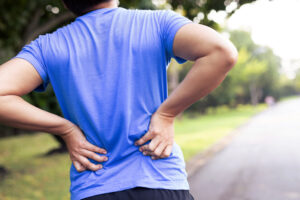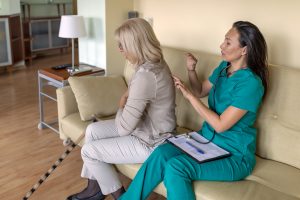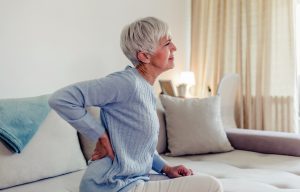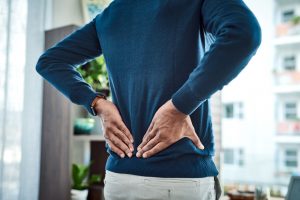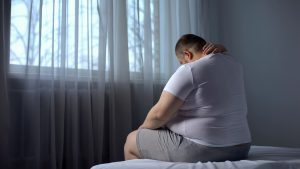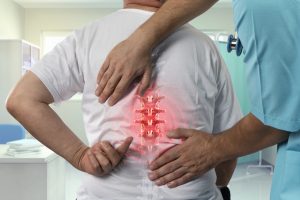Degenerative Spine
Degenerative spine conditions are the result of the loss of normal structure and function of the spine, typically due to age. The spine is made up of a complex series of muscles, vertebrae, ligaments, and discs – components that naturally deteriorate over time. The discs are particularly important because they are designed to act as shock absorbers for the spine. In addition to allowing for spinal flexibility, the discs prevent the bony vertebrae from grinding against one another.
Consequently, when the spinal discs deteriorate, they become less effective. Because the spine is a narrow column filled with sensitive nerve tissue, any change in the structural integrity or placement of the discs can potentially impinge upon adjacent spinal nerves, which is often the underlying cause of painful degenerative spine symptoms.
Types & Symptoms
Spinal degeneration is entirely unavoidable. As you age, the anatomical components that support your neck and back will naturally wear down as a result of years of use. We become less flexible as we age and more prone to neck and back pain – this is normal. However, when spinal deterioration advances to the point that symptoms interfere with regular activity, treatment is warranted.
- Spinal osteoarthritis – causes inflammation, formation of bone spurs, and nerve irritation
- Bones spurs – are asymptomatic but can become problematic if they come in contact with a nearby nerve
- Degenerative Discs – causes vertebrae to become slightly displaced and put pressure on the nerve roots
- Bulging Discs – is not inherently symptomatic but when it comes in contact with the spinal cord or nerve roots, painful symptoms can develop
- Herniated Discs – can be painful if the nerves in the disc wall become irritated as a result of a rupture, or if the extruded disc material irritates the spinal nerves
- Spondylolisthesis – indicated by the presence of vertebral misalignment
- Degenerative Scoliosis – causes a side to side curvature of the spine, which can result in symptoms such as a hunched back or a change in gait
- Spinal Stenosis – narrowing of the spinal canal which can irritate the spinal cord or other nerve structures if canal space becomes constricted
- Foraminal Stenosis – narrowing of the passageways through which nerve roots enter and exit the spinal canal
- Pinched Nerves – symptoms normally go away on their own over several days but if they persist they could be a by-product of one of the aforementioned spine conditions
- Sciatica – a term used to describe symptoms that arise from inflammation and irritation in the sciatic nerve
Treatment
Treatment for degenerative spine conditions depends on the type and severity of the condition. Following a degenerative spine diagnosis, most issues can often be successfully treated with a non-surgical approach such as conservative rehabilitation routines, which might include physical therapy, hot and cold compresses, or over-the-counter pain medication. If the symptoms worsen, your doctor may prescribe stronger medication or anti-inflammatory steroid injections. Some patients also find relief in the form of alternative therapies such as restorative yoga, acupuncture, and chiropractic manipulation.
Conservative and nonsurgical degenerative spine treatment options do not work for every patient but the surgeons at BEST Health System may be able to help those patients who are unable to find nonsurgical relief. We offer outpatient procedures using state-of-the-art technology for those who qualify as a candidate for our minimally invasive spine surgery.
Reach Out to BEST Health System Today
Degenerative spine can be a difficult condition to live with, but it can be successfully managed. If you are seeking to maintain a healthy and active lifestyle after being diagnosed with Degenerative spine, it is important to take a proactive approach to treatment. At BEST Health System, our multidisciplinary team has extensive experience in helping patients with a broad range of conditions find the relief they need for a good quality of life. From physical therapy to minimally invasive surgery, we’re committed to state of the art, patient centered care.
If you have experienced any of these symptoms or recieved a diagnosis and need treatment, BEST can help. Take the first step towards relief today.
Related Articles
Degenerative Joint Disease vs. Degenerative Disc Disease
Degenerative Joint Disease vs. Degenerative Joint Disease Degenerative joint disease and degenerative disc disease are similar-sounding conditions that can affect the spine, so you may […]
Three Common Causes of a Degenerative Spine
Understanding Spine Conditions A degenerative spine is a condition that causes the structures of the spine, such as the vertebrae, joints, discs, muscles, and ligaments, […]
Degenerative Spine - Part of the Aging Process
What is a Degenerative Spine Condition Degenerative spine conditions occur as a result of the natural aging process. As we age, our bodies go through […]
Does Degenerative Spine Disease Cause a Collapsed Disc?
What is a Collapsed Disc? “Collapsed disc” is an informal term that is sometimes used to refer to a spinal disc that has lost some […]
Degenerative Disc Disease - Top Causes
Living with Degenerative Disc Disease Degenerative disc disease, also known as DDD, causes neck and back pain in many people. It is a common spine […]
Understanding Spinal Decompression Surgery
Understanding Spinal Decompression Spinal decompression surgery can treat conditions affecting the cervical (upper) spine when conservative treatments have not brought the relief needed for a […]
Living with a Torn Disc
Living with a Torn Disc If you or a loved one is experiencing torn disc symptoms, you are aware of how painful they can be. […]
Does Excess Body Weight Lead to Spondylosis?
Understanding Spondylosis One of the leading causes of spondylosis is carrying excessive body weight. When individuals are obese, or even a few pounds overweight, it […]
Degenerative Spine Conditions: What to Know
Understanding Degenerative Spine Conditions Degenerative spine conditions — like osteoarthritis and herniated discs — are very common sources of neck pain, back pain, and other […]
Options for Degenerative Spine Surgery
Overview of Degenerative Spine Surgery Degenerative spine surgery can address a variety of spine conditions caused by aging, trauma, and genetics. The spine is a […]
The Effect of a Degenerative Thoracic Spine
The Anatomy of the Thoracic Spine Degenerative thoracic spine is a term used to describe a degenerative spine condition that has developed in the middle […]
How to Alleviate Back Pain: Simple Exercises
What Causes Back Pain? Back pain is one of the most common medical conditions experienced by individuals over the age of 30. Although there are […]

